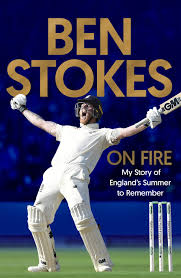On Fire
Martin Chandler |Published: 2019
Pages: 305
Author: Stokes, Ben
Publisher: Headline
Rating: 3.5 stars

Some of the most tedious cricket books that I have picked up are those concerning a season’s international cricket, to which one or more of the participants have lent their name. It has never been entirely clear to me why this should be the case. After all there have been some exceptionally good tour books and logic suggests that the insights that participants could provide would serve only to improve them, but the reality invariably disappoints.
The biggest problem that tour books have in the modern era is that the television coverage is so good, and so widely available after a series has concluded, that the old fashioned type of account which largely concerned itself with describing the play is simply no longer relevant. The involvement of the players seems to have been a natural development to try and keep the genre going but, as I say, in my experience it has generally failed in its aim.
Another disappointing category of books on the game are the ghosted autobiographies of those who, like Ben Stokes, are nowhere near the end of their careers. The problem in both situations is obvious. The player concerned will not say anything too controversial, in part because he is bound by the terms of his contractual arrangements with the Board employing him, and in any event is hardly likely to want to betray the trust of team mates. As a result I generally give these sort of books a miss.
It would have been the same with On Fire had it not been the case that, three years ago, I did pick up Ben Stokes’ early autobiography, Firestarter, and for the reasons set out in my review of that one had a pleasant surprise. Knowing that the writing in On Fire was the responsibility of the same collaborator, Richard Gibson, and given that by any standards the summer enjoyed by both England and Stokes this year was a remarkable one, I decided that On Fire was worth a look.
Stokes and Gibson were assisted, of course, by the 2019 English summer being one of the most dramatic ever. Not quite 2005 perhaps, but then I dare say there are a goodly number who would disagree with me on that. In any event I must keep reminding myself that many of those transfixed by Stokes’ twin peaks of Lord’s and Headingley were not even born when Michael Vaughan’s men produced their collective heroics.
On Fire begins, briefly, with a look at Stokes sojourn in the IPL in April and his concerns at the niggling injury that he picked up. The narrative then moves on to his return home, the warm up series against Pakistan and then an account of that remarkable World Cup campaign. The emphasis is, naturally, on the final and the central role Stokes played in England’s long awaited triumph. The accounts of the individual matches are much more than straight descriptions of the matches, and there are plenty of insights into Stokes’ thinking as the tournament develops even if he does not, as is to be expected, say anything by way of any significant criticism of any of his teammates.
There was no place for a resting Stokes in the one off Test against Ireland in late July, but at this point in the book he does stray beyond what might be considered strictly necessary and gives a full account of his desire to retrieve the England vice-captaincy and how he went about that. In particular I was surprised to see the full text of his email to Tom Harrison requesting that he be reinstated. Perhaps if the plea had fallen on deaf ears this part of the book would not have appeared. As it is Stokes’ reader is left in no doubt about the pride and pleasure he took from retrieving his appointment. I do hope that one day he gets the top job. I appreciate he has not actually written too many of the words in the book, but he certainly gives the impression of having great potential as a leader.
The second half of the book, dealing with the Ashes series, is perhaps the better half, if only because I am one of those who prefers Test cricket to the shorter formats. Again there is nothing from Stokes which might antagonise any of his teammates although, unsurprisingly and as widely reported in the press at the launch of the book, Australia’s combative opening batsman David Warner comes in for what might be termed a bit of criticism.
The standout part of the book is without doubt Stokes’ account of that historic innings at Headingley. No one who witnessed it will need any reminding of what took place and there are plenty of highlights packages around, but it is well worth reading Stokes’ account which is concerned not so much with what happened but what his thinking was as that unforgettable victory approached.
On Fire ends with story of the series levelling victory at The Oval. There is no reflective closing chapter, no doubt the reason for that being the anxiety to get the book written and published as soon as possible. In some ways that is a shame because earlier on there is an excellent look at the aftermath of the World Cup victory, but I suppose you can’t have everything. On Fire is clearly intended to catch the Christmas market. It will not be the only player in that particular marketplace, but I cannot imagine that anything will better it. The book is certainly one of the best of its type and recommended reading.







Leave a comment